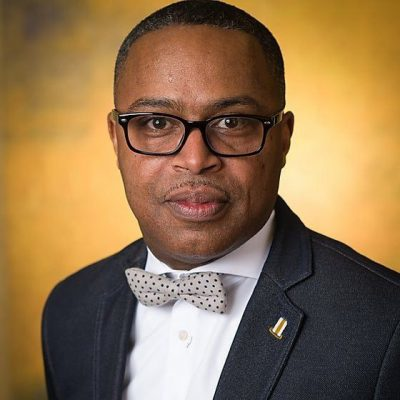Professors in particularly challenging fields of study are known to tell students early on, “Look to your left, look to your right. Two out of three of you will not be pursuing this major once this year is over.”
While that seems like tough language, the data backs it up. The National Center for Education Statistics says about 8 out of 10 college students will change their major at least once.  Dr. Calvin Moore, Jr.
Dr. Calvin Moore, Jr.
We all know of college students who are pre-med one minute and pursuing an architectural degree the next. A lot of those changes will be occurring early on, during the fall semester. We need to ensure that students, especially diverse students, don’t see this as a failure or setback but rather as an opportunity to help them find their way. Hopefully, some will take a path toward professions where their perspective and presence are critically needed.
For instance, I grew up dreaming of becoming the next Tom Brokaw, a TV broadcaster. Indeed, I’m now a communicator, but to a specialized audience. I’ve served as an early childhood educator and administrator for over 30 years. There aren’t a lot of men, let alone Black men, who’ve chosen a similar career path.
Less than 3% of preschool/kindergarten teachers (and less than 6% of child care workers) are men. It took my aunt’s gentle encouragement to initially lead me to work at a Head Start center.
Right away, Head Start put me into a program to earn a Child Development Associate® credential (CDA) at a community college. I learned about the CDA Competency Standards that help children move with success from one developmental stage to another. This gave me the confidence to understand how to nurture the emotional, physical, intellectual and social development of children. Later in college, I studied socioeconomics. The class reminded me how I thrived, growing up in economically challenging circumstances, thanks to the opportunities Head Start gave me.
Knowing that many college students will be making changes to their majors, we should help them understand that early childhood education requires professionals with many unique talents. In our culture, men often aren’t motivated to think of early childhood as an option, and minorities often aren’t presented with all the choices that exist. The Leading Men Fellowship and other initiatives help men from diverse backgrounds discover early education careers, whether they are in college or have yet to pursue a post-secondary education. We need to think creatively about how to open minds. When we hear a college student say they want to earn a degree and a good paycheck, we should help them understand the importance of pre-K to our economy.
As Fortune magazine reported, the U.S. child care market has a value of $47 billion. This is due in part to the 12.5 million children under age 6 who aren’t enrolled in kindergarten and spend part of every week being cared for by someone other than their parents, according to the U.S. Department of Education. And it’s a market that has room for growth; over half of U.S. children don’t have access to licensed child care, reports the Center for American Progress. We know all these factors are important to getting the economy moving again for working moms and dads as we recover from the COVID disruptions.
Anyone interested in being a manager would gain incredible experience trying to manage a pre-K classroom while juggling staffing demands and simultaneously handling the concerns of nervous parents.
College students interested in health care should also consider early childhood careers (yes, kids spread a lot of germs), and those who like the arts and music would be terrific teachers — there’s no better audience than a group of wide-eyed 3-year-olds.
We’re also a profession that embraces college graduates who want to work with us a few years and then move on. In fact, we see the CDA as the first step of a career ladder.
My career has led me to serve as the CEO of the Council for Professional Recognition, the first leader of this organization to also earn a CDA. We have nearly 1 million CDA-holders around the world. We’re a powerful, insightful group that plays a key role in helping close the COVID-related learning gap while also bringing equity to education.
It’s been said before, but we have enough college students working on Wall Street. We need more grads, especially from diverse populations, working on Main Street in early childhood centers. The words of advice we provide in the coming months to college degree-changers will have a powerful impact on their life choices. Let’s make sure they see the full array of options before them.
Dr. Calvin Moore, Jr., is the CEO of Council for Professional Recognition